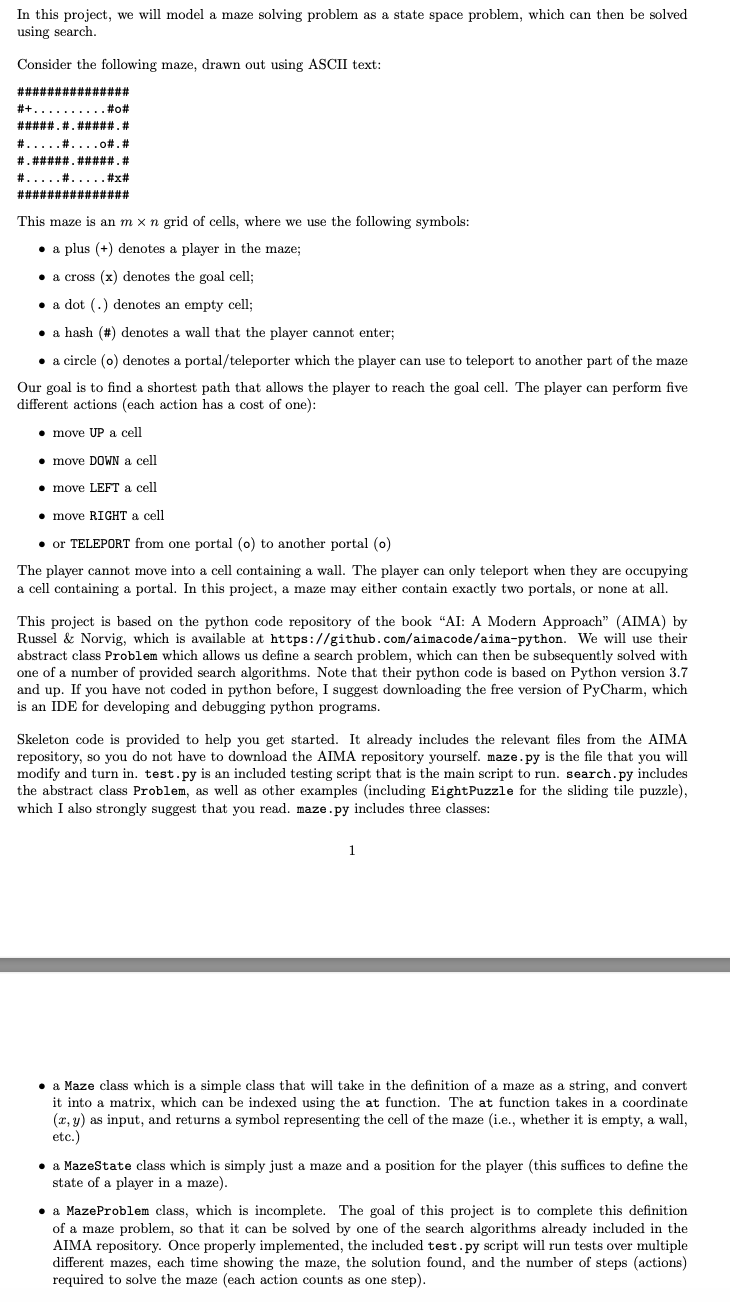Question
asap python on #Your Code Here with out put from search import Problem Basic class for representing a maze. Each maze cell is one of
asap python on #Your Code Here with out put

from search import Problem
"""Basic class for representing a maze.
Each maze cell is one of the following:
. is an empty cell
x is a goal
# is a wall
o is a teleporter (there are exactly two teleporter locations, or none)
""" class Maze:
def __init__(self,maze_string,maze_size):
"""define the maze using a string, and the maze width and height"""
# remove whitespace
width,height = maze_size
maze_string = "".join(maze_string.split())
assert len(maze_string) == width*height
self.matrix = self._string_to_matrix(maze_string,maze_size)
self.maze_size = maze_size
self.teleporters = [ i for i,c in enumerate(maze_string) if c == 'o' ]
self.teleporters = [ (i//width,i%width) for i in self.teleporters ]
self.goals = [ i for i,c in enumerate(maze_string) if c == 'x' ]
self.goals = [ (i//width,i%width) for i in self.goals ]
assert len(self.teleporters) == 0 or len(self.teleporters) == 2
def __repr__(self,position=None):
if position is not None:
x,y = position
marker = self.matrix[x][y]
self.matrix[x][y] = '+'
# draw maze as string
st = " ".join( "".join(row) for row in self.matrix )
# restore marker
if position is not None:
self.matrix[x][y] = marker
return st
def at(self,position):
"""returns the symbol at the maze location position=(x,y)"""
x,y = position
return self.matrix[x][y]
def cleared_goals(self):
"""returns a copy of the maze without any goals"""
maze_string = self.maze_string.replace('x','.')
maze = Maze(maze_string,self.maze_size)
def _string_to_matrix(self,string,size):
w,h = size
"""convert string into a character matrix of width w and height h"""
# turn the string into an array of rows
# where each row is a sub-string
mat = [ string[i*w:(i+1)*w] for i in range(h) ]
# break each row into an array
mat = [ list(row) for row in mat ]
return mat
"""This class keeps track of a maze, and a player's position inside of
the maze. When the state is printed, the player's position is denoted
with a + character"""
class MazeState:
def __init__(self,maze,position):
self.maze = maze
self.position = position
def __repr__(self):
return self.maze.__repr__(position=self.position)
def __lt__(self,other):
return self.position
def __eq__(self, other):
return self.position == other.position
def __hash__(self):
return hash(self.position)
"""This class defines a maze problem."""
class MazeProblem(Problem):
def __init__(self, initial):
"""A problem is initialized by its initial state.
This function does not need to be modified."""
super().__init__(initial)
def actions(self, state):
"""Give a maze state, we need to return a list of valid actions"""
# we have five possible actions, and we need to reduce these
# possibilities depending on the player's current position
possible_actions = ['UP', 'DOWN', 'LEFT', 'RIGHT', 'TELEPORT']
x,y = state.position
# we need to move any possible action that is
# invalid based on the current state of the maze
# YOUR CODE HERE
raise Exception("IMPLEMENT THIS FUNCTION") # comment this out
return possible_actions
def result(self, state, action):
"""Given a maze state and a valid action, return the resulting
state found by applying the action"""
x,y = state.position
# YOUR CODE HERE
raise Exception("IMPLEMENT THIS FUNCTION") # comment this out
return MazeState(state.maze,new_position)
def goal_test(self, state):
"""Return true if the given state is a goal state and return
false otherwise"""
# YOUR CODE HERE
raise Exception("IMPLEMENT THIS FUNCTION") # comment this out
pass
In this project, we will model a maze solving problem as a state space problem, which can then be solved using search. Consider the following maze, drawn out using ASCII text: \#\#\#\#\#\#\#\#\#\#\#\#\#\#\# \#+ . . . . . . . .\#\# \#\#\#\#\#.\#.\#\#\#\#\#.\# \#.....\#...o\#. . \#. \#\#\#\#\#.\#\#\#\#\#.\# #..x# \#\#\#\#\#\#\#\#\#\#\#\#\#\#\# This maze is an mn grid of cells, where we use the following symbols: - a plus (+) denotes a player in the maze; - a cross (x) denotes the goal cell; - a dot (.) denotes an empty cell; - a hash (\#) denotes a wall that the player cannot enter; - a circle (o) denotes a portal/teleporter which the player can use to teleport to another part of the maze Our goal is to find a shortest path that allows the player to reach the goal cell. The player can perform five different actions (each action has a cost of one): - move UP a cell - move DOWN a cell - move LEFT a cell - move RIGHT a cell - or TELEPORT from one portal (o) to another portal (o) The player cannot move into a cell containing a wall. The player can only teleport when they are occupying a cell containing a portal. In this project, a maze may either contain exactly two portals, or none at all. This project is based on the python code repository of the book "AI: A Modern Approach" (AIMA) by Russel \& Norvig, which is available at https://github.com/aimacode/aima-python. We will use their abstract class Problem which allows us define a search problem, which can then be subsequently solved with one of a number of provided search algorithms. Note that their python code is based on Python version 3.7 and up. If you have not coded in python before, I suggest downloading the free version of PyCharm, which is an IDE for developing and debugging python programs. Skeleton code is provided to help you get started. It already includes the relevant files from the AIMA repository, so you do not have to download the AIMA repository yourself. maze.py is the file that you will modify and turn in. test.py is an included testing script that is the main script to run. search.py includes the abstract class Problem, as well as other examples (including EightPuzzle for the sliding tile puzzle), which I also strongly suggest that you read. maze.py includes three classes: 1 - a Maze class which is a simple class that will take in the definition of a maze as a string, and convert it into a matrix, which can be indexed using the at function. The at function takes in a coordinate (x,y) as input, and returns a symbol representing the cell of the maze (i.e., whether it is empty, a wall, etc.) - a MazeState class which is simply just a maze and a position for the player (this suffices to define the state of a player in a maze). - a MazeProblem class, which is incomplete. The goal of this project is to complete this definition of a maze problem, so that it can be solved by one of the search algorithms already included in the AIMA repository. Once properly implemented, the included test.py script will run tests over multiple different mazes, each time showing the maze, the solution found, and the number of steps (actions) required to solve the maze (each action counts as one step)
Step by Step Solution
There are 3 Steps involved in it
Step: 1

Get Instant Access to Expert-Tailored Solutions
See step-by-step solutions with expert insights and AI powered tools for academic success
Step: 2

Step: 3

Ace Your Homework with AI
Get the answers you need in no time with our AI-driven, step-by-step assistance
Get Started


